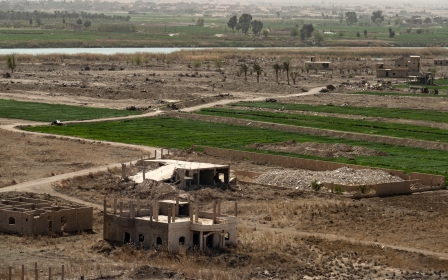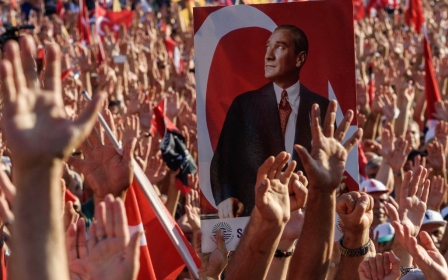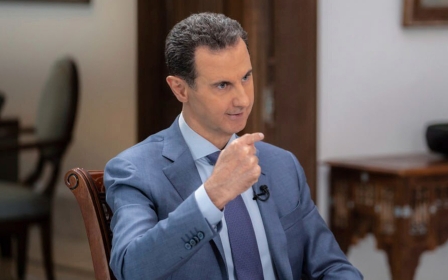Hundreds of Syrians left in limbo after being deported from Turkey
Mohammad al-Omar had just stepped off the bus when he was arrested in Istanbul. The 30-year-old Syrian was on his way to see his new baby boy for the first time after receiving medical treatment for his kidney disease in the nearby city of Bursa.
Now, one month on from his arrest, he is stranded in a shelter for deportees in Tel Abyad, in northern Syria.
His wife and two young children are more than 1,000km away in Istanbul. His sister and extended family are over 200km away in Azaz, Syria. He cannot reach either group of relations.
Omar is one of more than 1,800 Syrians who were deported through Tel Abyad in July, according to the border-crossing administration in the town.
The deportees are now stranded within a closed-off "safe zone" that extends across Raqqa and Hasakah provinces and is controlled by the Turkish-backed Syrian National Army. Almost all routes out, including to other parts of northern Syria, are closed, except by way of smugglers.
New MEE newsletter: Jerusalem Dispatch
Sign up to get the latest insights and analysis on Israel-Palestine, alongside Turkey Unpacked and other MEE newsletters
Turkey has stepped up its deportation efforts in recent months, after President Recep Tayyip Erdogon vowed to return one million Syrians to the north of Syria. Many of those sent back claim they were forced to sign "voluntary return" papers.
"I don't know anyone here, and my health is unstable," Omar told Middle East Eye from the shelter in Tel Abyad.
"My treatment has been suspended since I was arrested by the Turkish police, and my family is in Istanbul alone."
When he realised he was being deported, Omar said he had asked Turkish police if he could be sent back to his hometown of Azaz. They refused.
Muhanna al-Bakr, director of al-Bir Society for Social Services in Tel Abyad, said that its shelter supported around 200 deportees last month.
"They have no relatives and no place to go," he told MEE. "They were sleeping on the streets and in gardens."
Bakr said his organisation last month noticed a significant increase in the number of people being deported to the town.
"We used to host deportees in our homes... but it became necessary to find a shelter for people," he said.
No safe routes out
Ahmed al-Ibrahim, 18, was sleeping in a mosque until he was offered a place in the Tel Abyad shelter.
He told MEE that he was arrested with 10 other young men from a youth hostel in the Turkish city of Konya in early July. The group was forced to sign voluntary return papers after being arrested.
"We were working in Turkey to help our families in Syria," Ibrahim said.
"I have no one to turn to now. I have no way to get to the north of Aleppo where my family lives. The smuggling routes require $400 to $450, and they are very risky, and access through Turkey is impossible."
Fadel Abdulgany, executive director of the Syrian Network for Human Rights, said his organisation had also received reports of people paying between $400 and $500 to smugglers in order to reach other areas of northern Syria.
"There is a serious risk of people exposing their lives to danger, whether they try to return to the eastern regions... or if they attempt to enter Turkey again through irregular routes," he said.
Bakr said al-Bir Society was also aware of people turning to smugglers in order to leave Tel Abyad, and that they are concerned about the risk to people's safety.
"A person [trying to leave] could be arrested by one of the parties and suspected of being a spy or an agent, and this could put him in prison," he said.
Bakr added that the National Coalition of Syrian Revolution and Opposition Forces negotiated a transfer of 30 deported people from Tel Abyad to Azaz on July 2, in coordination with the Turkish authorities. However, no other formal transfers have so far taken place.
This has left Omar and hundreds like him in an impossible situation.
"There is no one to provide my family with expenses so that they can live [in Istanbul], and I am unable to bring them here, because I have nothing here," he said, while getting to other family members in northern Aleppo was also ruled out.
“Smuggling requires large sums of money and is dangerous," he said.
Registered residents deported
Many of the deportees had been living in Turkey for a number of years, and carried temporary protection cards with them known as the kimlik (identity) card.
Mohammad Moscow, 18, from Afrin, said he showed a copy of his temporary protection card on his phone to Turkish police when he was arrested last month.
"But they arrested me because I didn't have the paper itself," he said.
He is now stuck in Tel Abyad, with his family still in Istanbul, where he had been living with them for more than five years. Moscow said he usually relies on his family for support with his mental illnesses, and has never spent any time apart from them.
'People are being sent back to the place where they fled from in the first place'
- Nadia Hardman, Human Rights Watch
Moscow has struggled to communicate with others in the shelter since arriving in Tel Abyad in July, since he speaks only Kurdish and Turkish. He said that his family had searched for him for days after he was arrested, and finally made contact with him through other deportees.
Abdulgany said many of those being deported held temporary protection cards in Turkey and were not given the right to object to their deportation or appoint a lawyer.
Although Turkey is party to the 1951 Refugee Convention, which prohibits returning refugees to a country where they may be at risk of harm or persecution, the country has an exemption by which it recognises only European refugees, leaving the more than 3.7 million Syrians in the country with uncertain status.
Abdulgany said that no area of Syria is safe to return refugees to, and that the deportations from Turkey were triggering a "chain of violations".
In a report last year, Human Rights Watch (HRW) documented Turkey's arbitrary arrest, detention and deportation of hundreds of Syrian men and boys. In the report, HRW called for the EU to recognise Turkey as unsafe for asylum seekers.
"While Human Rights Watch hasn't verified the most recent reports of deportations, it's deeply concerning to see Turkey's complete denial of allegations," said Nadia Hardman, a researcher in HRW's refugee and migrant rights division.
"This is particularly in light of Turkey's continued policy not to really engage with allegations of deportation and to just continue to point to voluntary returns in its public information."
Hardman said the reports could amount to refoulement, or forcible return of refugees to where they are at risk of persecution.
"People are being sent back to the place where they fled from in the first place," she said. "And we just continue to see complete silence because it's part and parcel of the EU's outsourcing of its migration management control to third countries."
For 18-year-old Ibrahim, Turkey's recent deportation campaign has left him trapped.
"My family is in northern Aleppo... I don't know what to do," he said.
"And all my wages from work are still in Turkey. My future is unknown."
Middle East Eye delivers independent and unrivalled coverage and analysis of the Middle East, North Africa and beyond. To learn more about republishing this content and the associated fees, please fill out this form. More about MEE can be found here.




